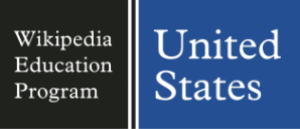On July 13, 2012, I had the pleasure to present, “Translation and Transnational Scholarship” at Wikimania 2012 at The George Washington University in Washington, D.C. In the presentation I spoke about my role as a Wikipedia Campus Ambassador in two of Professor Adel Iskandar’s graduate courses: New Media, Innovation, Community, & Dissidence (Fall 2011) and Media and Communications in the Arab World (Spring 2012) at Georgetown University through the U.S. Education Program (WP:USEP). Each course had two Wikipedia components: article creation and in-class group edits. I became involved with the USEP because I was eager to help students visualize news and history that had not been yet been represented as a part popular knowledge.

The U.S. Education Program came to Georgetown in the Fall 2010 term and has since been incorporated into 14 courses university wide. The program provides assistance to professors who want to integrate Wikipedia article creation and editing as part of a course. The support materials include not only wiki markup handouts and brochures, but also both online and offline points of contact. In the classroom, a Campus Ambassador (me, in this case) gives two tutorials, one that focuses on introducing the students to the culture of Wikipedia and one that focuses more on the technical aspects, such as how to contribute a photo and how to edit existing Wikipedia articles. In addition, the program includes the support of an Online Ambassador, who assists the students with more technical questions.
It was extremely enriching to watch the students become explorers during the course. They had to find and discover legitimate sources to not only support emerging social movements, but technologies as well. Students thus found creative ways of writing about technological phenomena as they unfolded in the Arab world, such as finding Arabic citations about the Rassd News Network (RNN), an Arabic Facebook feed, translating them, and making the topic notable for the Wikipedia community and public at large.
I would argue that the more interesting side of Wikipedia editing occurs on the article talk pages, where knowledge production takes place. It helps students think critically about who decides what is notable or worth adding to the article’s content. It is not one person producing content, but multiple people collaborating together to decide what and how it should be said (and cited!). It is this collaborative aspect of Wikipedia editing that indirectly creates an incentive for academic research offline: What was the process of creating a Wikipedia article? Why was one source rejected and one not? These questions help augment the following high impact learning outcomes: media and information literacy, critical thinking and research skills, and writing skills development. These outcomes help deepen student learning and engagement, both in and out of the classroom.
There was a total 17 new English articles created about Arab media and politics in the 2011-2012 academic year. Here is the complete list of articles:
Fall 2011:
Rassd News Network (RNN)
Speak to Tweet
Spring 2012:
Abdel-Bari Zamzami (about a famous Moroccan controversial cleric)
@Mujtahidd (about a prominent dissident Saudi micro-blogger)
Telecom Egypt (about telecom egypt, a government/private telecom company)
Omar Offendum (about a Syrian-American rapper)
Reem Maged (about a prominent Egyptian talkshow host)
Bassma Kodmani (about the spokesperson for the Syrian national congress, the opposition to the government).
Al tahrir tv channel (about a prominent Egyptian satellite network)
The Narcicyst (about an Iraqi-Canadian rapper)
Ibrahim Eissa (about a prominent Egyptian talkshow host)
Al-Sadr Online (website for high board, religious media org)
Kharabeesh (about a popular Arabic animation production house)
Baladna_bel_Masry (about a prominent talkshow on Egyptian private network)
Youm7 (about a popular print newspaper in Egypt)
Nicholas Oxenhorn, a student in Professor Iskander’s course “Media and Communications in the Arab World,” noted that he decided to create the Telecom Egypt article because he wanted to shed light on the importance of the technological infrastucture that supports and aids the production of new media content in the Arab world.

“Telecom Egypt played a pivotal role in the internet shut off that occurred on January 27, 2011 in an effort to quell protests,” Nick said. “Unearthing and categorizing some of the facts about governance, operations, and production behind Telecom Egypt in the form of a Wikipedia article seemed like a really good idea to me — something that might lead to a broader understanding of where the actual potential for regulation and internet freedom/decentralization might exist post-revolution if a company like this continued to persist in a comparable form.”
Not only were the students able to create new articles for the English language Wikipedia, but they fostered a new incentive for translation and the possibility of beginning an exciting form of transnational scholarship with the Wikipedia Education Program in Cairo, Egypt. The 17 new articles created about the Arab world in on the English language Wikipedia paved the way for more translation to occur, pushing students to create content that can be transferable to the Arabic Wikipedia. Now students in the Wikipedia in Arabic Education Program will have material to translate and add to over time.
Kelsey Brannan is a volunteer Campus Ambassador at Georgetown University and a M.A. student in Communication, Culture, and Technology. Click here to view her Wikimania slides.

Can you help us translate this article?
In order for this article to reach as many people as possible we would like your help. Can you translate this article to get the message out?
Start translation